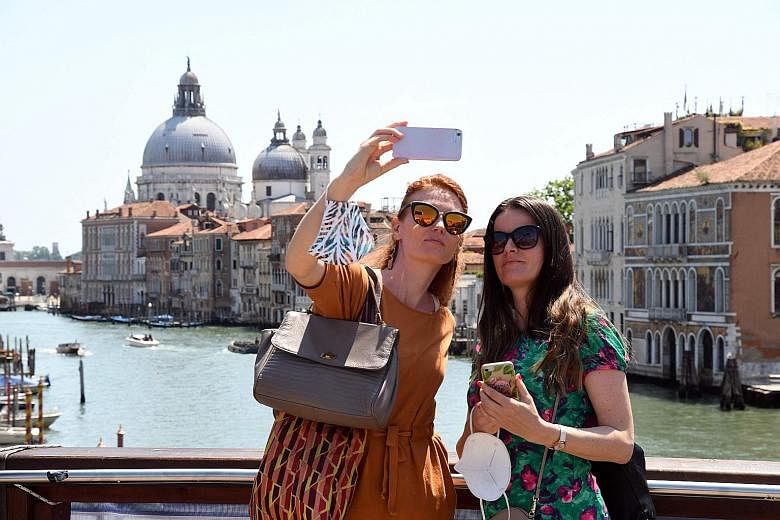LISBON/LONDON • While not a complete washout, the summer tourism season vital to southern Europe's economies will be less than sizzling as the Delta variant of the coronavirus spreads and travel hurdles keep sun-seekers at home.
A European Union Covid-19 travel certificate launched yesterday may help some make trips, but arrivals to tourist hot spots from Portugal to Croatia are set to remain well down from normal levels as they face a hodgepodge of entry rules across the bloc.
The certificate - essentially a QR code available on smartphones or on paper - shows whether the bearer is vaccinated with one of the EU's approved jabs, or whether they have recovered from an infection or recently tested negative.
Under EU law, the certificate is meant to do away with the need for quarantines or further testing when travelling between the EU's 27 countries or four associated European nations (Iceland, Norway, Switzerland and Liechtenstein).
While all EU member states except Ireland were connected to the digital certificate system yesterday, a surge in the Delta variant, first detected in India and now quickly gaining ground elsewhere, could trigger an "emergency brake" provision suspending the certificate's acceptance.
Already, Germany has a ban on incoming travellers from Portugal, where the Delta variant has become dominant.
Only its own citizens or residents are allowed in from Portugal, and they must quarantine for two weeks upon arrival.
The Delta variant recently led to a rise in cases in Portugal's tourist magnet Albufeira and is to blame for over half of new infections in the capital Lisbon.
Berlin's decision has raised Brussels' ire, with EU Justice Commissioner Didier Reynders saying on Wednesday that "we should avoid travel bans" within the EU and stressing that Germany should have consulted its partners first.
In Britain, while travellers from its "green list" of destinations - including Australia, New Zealand and Iceland - need produce only a negative Covid-19 test, visiting is made difficult for the rest of the world by strict curbs on arrivals, costly quarantine requirements and Covid-19 tests.
A major headache for the British industry is coping with sudden rule changes in destination countries Portugal, Spain and Malta, which all abruptly increased restrictions for travellers from Britain, although the three said they would accept fully vaccinated Britons.
In Greece, where tourism makes up a fifth of the economy, the central bank this week cited concerns over new variants as it cut forecasts for tourism revenues this year from 50 per cent to 40 per cent of those in 2019, when it welcomed a record 33 million visitors.
The country is hoping to reach about half of its pre-pandemic tourism revenues, with arrivals from EU countries and the Schengen area authorised, as are residents of Canada, the US, Israel, China, Thailand, Russia and Saudi Arabia.
But visitors are still required to fill in a form and produce proof of full vaccination, a PCR test of less than 72 hours, an antigen rapid test of less than 48 hours or a certificate of post-infection immunity.
Meanwhile, Mallorca and Spain's other Balearic islands are reaping the benefit of the June 30 move by Britain to allow Britons to travel there without having to quarantine upon return: air bookings there stand at 80 per cent of pre-pandemic levels.
"Since restrictions for UK tourists were lifted, they are back. In the first 24 hours, we had reservations equivalent to 10 days of 2019," said a spokesman for Spanish chain Melia Hotels.
However, a new wave of infections is inevitable if citizens and lawmakers do not remain disciplined, warned the head of World Health Organisation (WHO) in Europe, Mr Hans Kluge, in a news briefing yesterday.
Mr Kluge said that the number of new cases rose by 10 per cent last week, driven by increased mixing, travel, gatherings and easing of social restrictions.
"This is taking place in the context of a rapidly evolving situation. A new variant of concern - the Delta variant - and in a region where despite tremendous efforts by member states, millions remain unvaccinated," he said.
"There will be a new wave in the WHO European region unless we remain disciplined," he added.
REUTERS, AGENCE FRANCE-PRESSE

